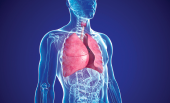This study analyzed the risk of clinical trial failure during non-small cell lung cancer (NSCLC) drug development. NSCLC drug development was investigated using publically available resources. Analysis was conducted in regard to treatment indication, compound classification, and mechanism of action. The results showed that six hundred seventy-six clinical trials that included 199 unique compounds met the inclusion criteria. The likelihood, or cumulative clinical trial success rate, that a new drug would pass all phases of clinical testing and be approved was found to be 11%, which is less than industry aggregate rates. Over half of the biomarkers used in NSCLC have not yet been approved by the Food and Drug Administration in any indication. Biomarker targeted therapies (62%) and receptor targeted therapies (31%) were found to have the highest success rates. The risk-adjusted cost for NSCLC clinical drug development was calculated to be U.S. $1.89 billion. The authors conclude that biomarker use alone in this indication results in a six-fold increase in clinical trial success whereas receptor targeted therapies did so by almost threefold. Physicians who enroll patients in NSCLC trials should prioritize their participation in clinical trial programs that use biomarkers and receptor targeted therapies. J Thorac Oncol. February 2014. PMID: 24419412.
Home Research News Biomarkers and receptor targeted therapies reduce risk in non-small cell lung cancer









